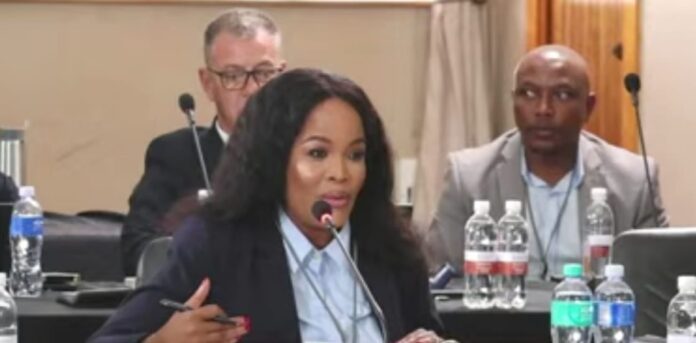MPs attending the first inquisitive parliamentary sitting inside the formidable Kgoši Mampuru Correctional Facility in Tshwane were hit with a financial thunderbolt on Monday, and the person delivering it was none other than SAPS chief financial officer Lieutenant General Puleng Dimpane.
Dimpane appeared before the Ad Hoc committee investigating allegations made by KwaZulu-Natal police commissioner Lieutenant General Nhlanhla Mkhwanazi, and what was expected to be a tidy breakdown of the Political Killings Task Team (PKTT) expenditure quickly spiralled into a saga of temporary policing structures swallowing hair-splitting amounts of money.
PKTT cost R432m over six years
The CFO told the committee that the PKTT, which has since become the talk of the town following suspended police minister Senzo Mchunu’s decision to shut it down for being too expensive, cost the South African taxpayer R432-million over six years.
Members of Parliament were still processing that number when Dimpane delivered the knockout blow. She stated that the July 2021 Unrest fiasco alone devoured R950-million in a matter of months.
And when asked where the money came from, Dimpane did not sugar-coat it.
“It was drawn directly from the SAPS budget and we needed to reprioritise. It was a situation that was confronting us. We needed to reprioritise and ensure that we contain that situation,” she said.
Temporary policing interventions
To understand the PKTT bill, Dimpane walked the committee through the expensive reality of temporary policing interventions. The units or task teams assembled from across the country and deployed where violence erupts. Incurring accommodation, meals, transport and overtime costs at scale. This included the PKTT.
“The members of this task team [PKTT] are from across various environments. And you need to accommodate them as in when they need to go and operate in KwaZulu-Natal or elsewhere in the country,” she said.
“You need to also ensure that there is food. They do work; they do claim overtime in this particular area. This is not anything that is strange. This is how the work of the police is done.”
Her testimony painted a vivid picture of policing by crisis, which is expensive, reactive and never truly permanent.
Nature of task teams
“Those task teams would have been established for a specific period to go and achieve a specific outcome. So, they are temporary in nature. These interventions as well as these task teams. They are not permanent in nature,” she said.
“They are established for a specific period… a specific purpose and there will be cost estimates that will be submitted to the national commissioner. And the submission will come to us to confirm if funding is available.”
Evidence leaders pressed her on whether the PKTT would have been cheaper if it were a permanent unit.
“If it was a permanent team or a permanent unit, let’s say for instance it is established in KwaZulu-Natal… then you would not have an expenditure line item that is called accommodation. Because members would be permanent and staying in their homes,” she said.
Accounting officer’s role
“You wouldn’t have an expenditure item called meals because the members would be permanent at home. Safe to say that perhaps from time to time they would be required to travel elsewhere to another province on investigation.”
Dimpane emphasised that the finance division has no role in deciding whether policing interventions are permanent or temporary.
“What is required from us is to support those interventions to ensure that the country is safe,” she said.
“All these expenditures would have been approved by the accounting officer [General Fannie Masemola].”
Earlier in her testimony, Dimpane dropped another bombshell. The anti-zama-zama intervention Operation Vala Umgodi has already burned through more than R1.1-billion in the past three financial years. This amount, she clarified, did not come from the SAPS budget baseline.
CARA funding method
“The CARA [Criminal Assets Recovery Account] funding is used to assist departments. From time to time, the accounting officer, having assessed alternative financial sources, would approach the CARA committee. The Vala Umgodi intervention is funded from that particular source. And this source is not part of our baseline,” she said.
What emerged from the session was a policing paradox of crisis-driven task teams that are temporary on paper but permanent in price.
Before breaking for tea, Dimpane told the committee that SAPS spending is dictated not by neat budget plans, but by ever-evolving criminal realities.
“We deal with different situations… There are stubborn crime patterns that would demand or require from the SAPS leadership to then deal with them applying other methodologies. Different policing problems emerge from time to time,” she said.



